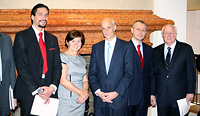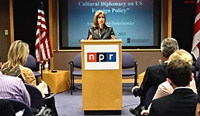The International Symposium on Cultural Diplomacy in the USA 2012
"A Global Dialogue about Cultural Diplomacy, National Security and Global Risks"

Symposium Agenda
Past experience has shown that the use of hard power alone is not sufficient to sustainably respond to and to reduce threats to national security, and many of the global challenges facing states today require common solutions, which arise out of cooperation rather than coercion.The International Symposium will provide an opportunity to examine and analyze the increasing importance of soft power tools and cultural diplomacy practices. The conference will also offer ideas as to how the US, as well as the rest of the world, can use smart power strategies to more effectively tackle global risks and increase global peace and prosperity.
The goal of the International Symposium on Cultural Diplomacy in the USA 2012 is to “inject” new momentum into the debate over the role of cultural diplomacy and soft power and their potential to assist in guaranteeing National Security and combatting Global Risks.
The following issues will be included and explored:
- US National Security in the Face of Global Risks - The Impossibility of Meeting the World’s Challenges and Risks Alone
- The Limitations of Hard-Power Strategies and the Long-Term Consequences of Hard Power to Building Sustainable International Relations
- The US Foreign Relations and of the Role of the US – What Does Today’s Interdependent World Expect from the United States?
- The Perception of the United States Abroad - Using Cultural Diplomacy to Improve the US Image Abroad (America as an ‘Indispensable Leader’ rather than an ‘Indispensable Nation’)
- Cultural Diplomacy in Politics and Terrorism - Using the Full Range of Tools in both Interior and Foreign Relations
- The Practice of Cultural Diplomacy and a Comprehensive Smart Power Strategy to Assure National Security
- Civil-Society Movements and Ideological Conflicts - Cultural diplomacy as a Means of Promoting Civilian Participation in Diplomacy
- The Impact of Soft Power Strategies as Opposed to Hard Power Strategies on International Economics, Trade and Investment

Cultural Diplomacy:
Reducing Global Risks and Increasing National Security
By Mark C. DonfriedGovernments in the twenty-first century are faced with a variety of global security risks including terrorism, war and conflicts, stereotypes/misconceptions and ideological conspiracies, to name but a few. These risks have manifested themselves in a verity of different ways, by actual violent attacks on citizens (September 11th, 2001) or through “verbal attacks” expressed via social media (conspiracy theories regarding CIA complicity in the World Trade Center attacks).
These social media assaults work to create negative public opinion trends that, in turn, cause citizens to suspect and mistrust governments and institutions. The power of ideology is immense, and can reel in people that would normally never be attracted to terrorism, encouraging them to participate in destructive activities against their own as well as other countries. Osama bin Laden, to name the most prominent example, managed to attract individuals to subscribe to and glorify his ideology by demonizing the US and the West via verbal propaganda.
Any attempt to analyze how to prevent and tackle the many forms of global risks that plague our world today must review the primary causes and incentives for individual and group attraction to terrorism. Important factors to consider may arise from ideological reasons, lack of access to basic resources and rights, as well as the pervasive belief that individuals’ voices (no matter the values they espouse) are not being heard.
Therefore, it has become apparent in today's interdependent world that the legitimacy of cause is of vital importance to both state and supranational governments. In establishing legitimacy in both the domestic and international spheres (public support for the government as well as the support of the international community) with the ultimate goal of reducing global risks and increasing security, a multi-level strategy is an absolute necessity. Despite its vital importance, the use of cultural diplomacy in addressing global risks remains largely underutilized. In many ways, the application of cultural diplomacy practices can complement the other, more traditional ways of increasing security (military measures or increased access to intelligence), by means of exposing and challenging destructive ideologies.
By helping to educate, enhance and sustain relationships, the application of cultural diplomacy can assist in building and improving dialogue, understanding and trust between governments and citizens all over the world at the local, national and global levels. The stronger the relationships between citizens and governments, the more trust will be fostered and the less ideological incentives there will be for citizens to resort to terrorism and violent activities. Bringing governments and citizens together into a constructive dialogue will profoundly increase mutual understanding, confidence and trust and can be accomplished relatively easily through cultural exchange programs as well as grass-roots community initiatives supported by governments.
By engaging the fields of art, music, sports, religion and civil society and by working in partnership with representatives of those fields and other cultural diplomats, governments can more effectively communicate their messages within and beyond their borders and move closer to their citizens. This closeness will be sustained over time; however can immediately reduce major gaps or conflicts.
In addition, by endorsing cultural diplomacy, which is generally accepted as a positive and constructive activity throughout the world, governments can demonstrate their support for cultural diversity and multiculturalism and improve their images abroad.
The most notable benefit of including cultural diplomacy practices and tools into national agendas, however, is that it is cost effective compared to the alternatives. In addition, cultural diplomacy is inherently constructive in nature, as to destructive alternatives such as military or police action.
While cultural diplomacy as an international-relations tool can be applied across-the-board, implementation of particular strategies and tactics would of course need to be hand-crafted on a case-by case basis, taking into account all relevant historical, political, economic and cultural factors.



































































